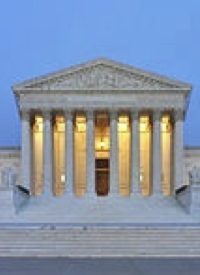
The U.S. Supreme Court has declined a religious discrimination case filed by a pair of Christian groups at San Diego State University. In 2005 Alpha Delta Chi, a Christian sorority at the school, and Alpha Gamma Omega-Epsilon, a Christian fraternity, challenged the university’s “non-discrimination” policy requiring that in order to receive campus recognition and funding, Christian student groups could not require members to sign a statement of faith — a rule the groups contend opens the door for individuals with non-Christian views to hold leadership positions.
While a lower court agreed with the groups’ charge that the policy trampled their constitutionally protected religious freedom, in 2011 that ruling was overturned by the 9th U.S. Circuit Court of Appeals, a decision the High Court declined to reconsider.
The Alliance Defense Fund (ADF) noted that while San Diego State prohibits campus Christian organizations from requiring statements of faith for their members and leadership, it allows other student organizations to require members and leaders to agree with the viewpoints those groups advocate.
“Public universities should encourage, not censor, the free exchange of ideas,” said ADF Senior Counsel David Cortman. “But for now, the supposed marketplace of ideas at San Diego State University will remain a stronghold for censorship. We wish the Supreme Court would have used this opportunity to make clear that the First Amendment protects the right of student groups to employ belief-based criteria in selecting their members and leaders.”
Cortman said that the university policy supposedly meant to ensure non-discrimination on campus actually facilitates discrimination against faith-based student groups. “Throughout the years of defending its policy, the university did not tell the Democratic club it must be led by a Republican, or the vegetarian club that it must be led by a meat-eater,” he recalled. “But it did tell Christian groups that they must allow themselves to be led by atheists. When political conformity is placed ahead of the constitutionally protected rights of students, all students — including students of faith — suffer.”
The ADF attorney warned that the High Court’s refusal to consider the merits of the student groups’ arguments means that religious discrimination will continue to be a serious issue at universities across the nation.
The San Diego State policy is similar to those at other campuses, specifying: “No campus shall recognize any fraternity, sorority, living group, honor society, or other student organization unless its members and leadership are open to all currently enrolled students at that campus….” Groups that refuse to abide by the policy cannot receive crucial student funding, and cannot post signs on campus, use campus offices or meeting space, or post on the university’s website. The two Christian groups in the case have struggled to stay afloat since refusing to obey the school policy, which they contend is unconstitutional.
Cortman observed to the Christian Post that to most people, it would be logical that “whether a group is religious or not, having a leader who shares the group’s beliefs is simply common sense. This is especially so when many other [non-religious] student clubs are permitted to choose leaders who share their ideological beliefs or viewpoints.” But in this case, at least, logic and law are in separate camps, he said.
“The point of allowing students to form groups around those who are like-minded is to promote the supposed marketplace of ideas and to increase scholarship and debate,” Cortman told the Christian Post. “Nor does it increase the coveted diversity or tolerance we so often hear about to essentially silence certain groups by requiring them to be led by those who may disagree with their views.”
Noted Christian commentator Charles Colson recalled that in 2010 the Supreme Court itself helped to set the trend for discrimination against Christian groups when it ruled in the case of Christian Legal Society v. Martinez that a public university can refuse a student organization if it restricts members or leaders to those who share its unique beliefs.
The result of that far-reaching verdict is that established Christian groups like InterVarsity or Campus Crusade for Christ, which rely on strong Christian leadership for their gospel mission, “now run the risk of being kicked off campus if they say that only Christian students may hold leadership positions,” wrote Colson. He challenged that such a policy “makes no sense. It’s like forcing campus atheists to make Billy Graham their president! Of course we would welcome nonbelievers to hear the gospel, but they can’t run our groups!”
Colson noted a handful of prominent cases in which the High Court’s ruling has emboldened university officials to target Christian groups at their schools. Ironically, those cases are all concentrated in the nation’s “Bible belt.” For example, Nashville’s Vanderbilt University now boasts a policy that bans Christian groups on campus from requiring their student leaders to embrace the group’s core beliefs. “Vanderbilt’s Intervarsity Graduate Christian Fellowship is in the thick of the battle there,” Colson noted.
Similarly, at the University of North Carolina-Chapel Hill, “the administration has launched a task force to explore ending the right of religious groups to exclude nonbelievers,” Colson observed. “And now, UNC-Greensboro is denying recognition to student groups that restrict their members and leaders to a set of religious beliefs. But it’s targeting only those not affiliated with a church, saying they are not really religious. That’s a neat trick — take away religious freedom by saying it doesn’t apply to a nondenominational group.”
While such attacks on faith may seem far removed from the experience of most Americans, Colson warned that it may be hitting closer to home than many think. “Let me ask you,” wrote the seasoned evangelical spokesman: “Do you know whether this anti-Christian bigotry has spread to the university you attended, or where your kids or grandkids go? It’s time you find out and speak out.”



